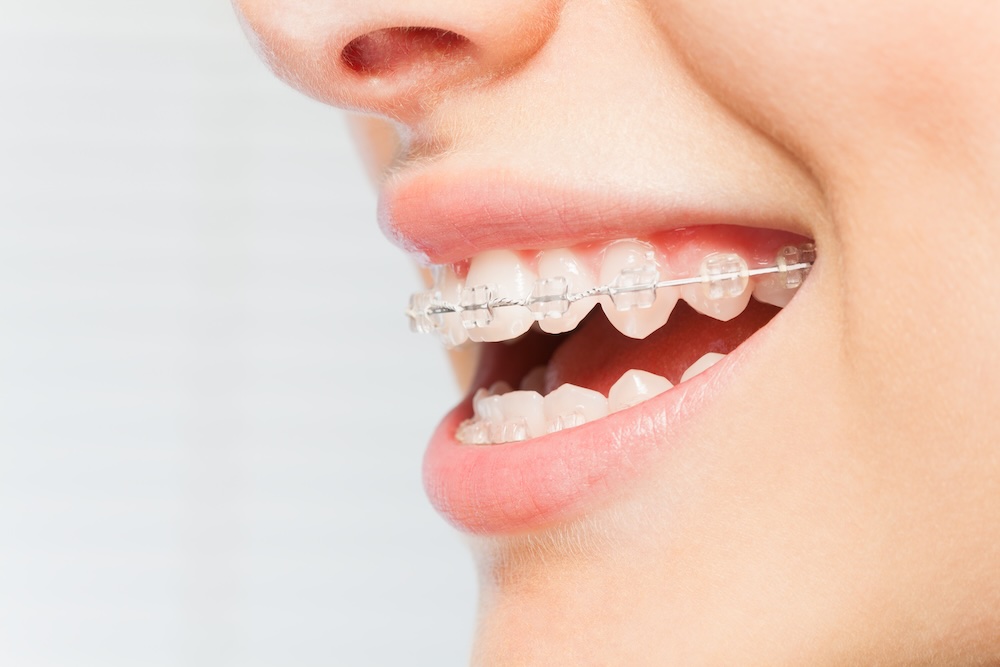When patients begin exploring orthodontic options, ceramic braces often come up as a potential solution, especially for those who want a more discreet appearance.
And while these systems offer visual benefits, they may not always be the most effective or practical choice.
In this article, we’ll explain what ceramic braces are, explore their advantages and drawbacks, and walk through the alternatives that we recommend for achieving both aesthetic and functional results.
What Are Ceramic Braces?
Much like traditional metal braces, ceramic braces function by using brackets and wires to move teeth into alignment over time.
The key difference is the bracket material. Instead of metal, ceramic braces use tooth-colored or clear composite brackets to create a less noticeable appearance. Many orthodontists refer to ceramics as “clear braces” because of how the brackets blend in with your teeth.
While ceramic braces are more subtle than traditional metal options, they still aren’t as discreet as clear aligners.
The brackets are visible up close, and because they remain fixed on the teeth, they can be more noticeable in certain lighting or angles — especially when elastic ties are used.
According to the FDA’s guide to orthodontic appliances, ceramic brackets have become increasingly common due to their cosmetic appeal. However, appearance isn’t the only factor to consider.
Pros and Cons of Ceramic Braces
Ceramic braces strike a balance between aesthetics and fixed-appliance reliability. However, as with any system, they come with some trade-offs.
Benefits of Ceramic Braces
The primary advantage of ceramic braces is their subtle look. Because the brackets are tooth-colored, they blend into the smile more naturally than metal braces.
For adults in professional settings or image-conscious teens, this is often a key selling point.
Ceramic options can also treat a wide range of orthodontic issues, from minor spacing to complex misalignment.
These are some of the standout features that make ceramic braces appealing:
- Less visible than metal braces
- More comfortable in appearance for professional or social situations
- Effective for both simple and complex alignment issues
Limitations of Ceramic Braces
Despite their aesthetic appeal, ceramic braces introduce several limitations that are worth weighing before making a decision.
One common concern is durability. Ceramic brackets are more brittle than metal, meaning they can chip or break more easily. Additionally, they tend to be bulkier, which may cause more irritation than more discreet metal options.
Another issue is staining. Although modern materials are more resistant than early versions, ceramic or clear brackets can still discolor over time — especially if elastic ties are used.
Pigmented foods and drinks like coffee, wine, or curry can accelerate this process.
Ceramic systems also tend to be more expensive and may prolong treatment times due to increased friction or the need for more cautious force application.
Some of the most common drawbacks you should be aware of include:
- Brackets are more fragile than metal
- May cause more irritation due to size
- Staining remains a possibility with prolonged wear
- Often more costly than traditional metal braces
Our Take on Ceramic Braces and Clear Bracket Systems
At Orthobar, we do offer a ceramic composite bracket system called Symetri™ Clear for those interested in a more aesthetic approach. However, it’s not typically our first recommendation.
While this system is better than other ceramic options, we’ve found that most patients achieve better results through alternatives that offer greater efficiency, comfort, and visual appeal over the long term.
We prioritize solutions that balance treatment outcomes with lifestyle needs without sacrificing results, including Damon Ultima Braces and clear aligners.
Our Recommended Alternatives: Damon Ultima™ Braces & Clear Aligners
Modern orthodontics has evolved well beyond typical metal braces. Two of the most effective and patient-preferred systems we offer at Orthobar are Damon Ultima self-ligating braces and clear aligners.
Damon Ultima Braces
For patients who prefer a fixed solution but want something more refined than bulky traditional braces, Damon Ultima offers a sleek, low-profile design.
This self-ligating system eliminates the need for elastic ties, which means fewer places for plaque to collect and a lower risk of staining. It also reduces friction, making adjustments more comfortable and often shortening total treatment time.
Clear Aligners
Clear aligners are nearly invisible and removable, making them an excellent choice for patients who want complete control over their appearance and comfort.
They work by using a series of custom-molded trays to shift teeth into alignment gradually.
Patients can remove them to eat, brush, and floss, which simplifies oral hygiene and makes them ideal for adults with busy lifestyles.
For most mild to moderate cases, clear aligners are a highly effective solution. And in more complex cases, Damon Ultima braces may be a better fit. Either way, we’ll help you choose what works best for your individual goals.
Final Thoughts: Your Smile, Your Choice
Ceramic braces offer a valuable cosmetic improvement over traditional metal, but they aren’t always the most practical or comfortable choice.
At Orthobar, we help patients find options that do more than just look good — they feel good, function efficiently, and lead to lasting results.
Ready to take the first step? Schedule your complimentary consultation and discover the right orthodontic solution for your smile.






